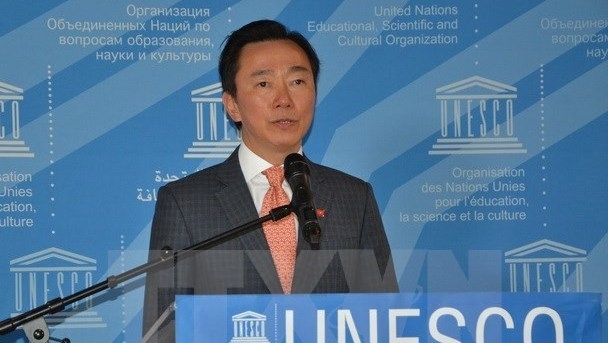
Vietnam’s candidacy for the post of UNESCO Director-General demonstrates the country’s sense of responsibility to the international community, even though its candidate did not receive many votes in the first round of voting in Paris on October 9.

Ambassador Pham Sanh Chau is the Vietnamese candidate for the UNESCO Director-General position (Photo: VNA)
The Qatari
candidate, Hammad bin Al-Kawari, won the most votes – 19, followed by France’s
Audrey Azoulay and Egypt’s Moushira Khattab. With no candidate winning more
than half of the votes, the UNESCO Executive Board will conduct the second
round of voting at the end of its meeting on October 10.
This is the first time Vietnam has had a candidate in the
running for a leading position of a major UN agency. The election campaign has
helped the country enhance its position and role in the international arena while
strengthening cooperation with other countries.
The Vietnamese candidate, Pham Sanh Chau, has campaigned
in more than 30 member countries of the UNESCO Executive Board, during which
time he introduced Vietnam’s history and culture, together with achievements of
the Doi Moi (renewal) process and potential for international cooperation.
Vietnamese officials also lobbied for support during
their meetings with foreign partners. In response, officials of many countries
spoke highly of Vietnam’s external policy of peace, independence and
international integration, and appreciated the country’s wish to contribute
more to international affairs in general and to UNESCO in particular.
Vietnam marked its joining UNESCO 40 years ago on June 15
this year.
The country has received UNESCO’s assistance in access to
know-how, technology and global funding to contribute to national construction,
as well as to fine-tuning laws, Party and State policies and guidelines.
Source: NDO
The first summit between the European Union (EU) and the Gulf Cooperation Council (GCC) in Brussels, Belgium, marked an important step forward in their bilateral relations.
The 45th General Assembly of the ASEAN Inter-Parliamentary Assembly (AIPA-45) opened in Vientiane on October 19.
Many countries are grappling with rapidly aging population. As population aging becomes an irreversible global trend with significant impacts on economic and social sectors, nations face the urgent task of creating flexible policies to adapt to and make the most of this trend to build prosperous and sustainable societies.
With a series of stimulus measures, the world tourism industry is on the way to recovery as before the COVID-19 pandemic broke out. Facing the opportunity to take off, the "smokeless industry” is expected to strongly contribute to global economic growth while promoting potential and cohesion, contributing to peace and sustainable development.
The danger from the COVID-19 pandemic is still latent, threatening people’s health and lives in the context that the immunity provided from the COVID-19 vaccine has decreased. Many other dangerous diseases are also likely to break out when the global vaccination rate slows down, due to inequality in access to health services, vaccine hesitancy, and consequences of economic recession.
The Association of Southeast Asian Nations (ASEAN) is witnessing a rise in the sales of electric vehicles (EVs) in Vietnam, Malaysia and Indonesia, according to Maybank Investment Bank Research (Maybank IB Research).



